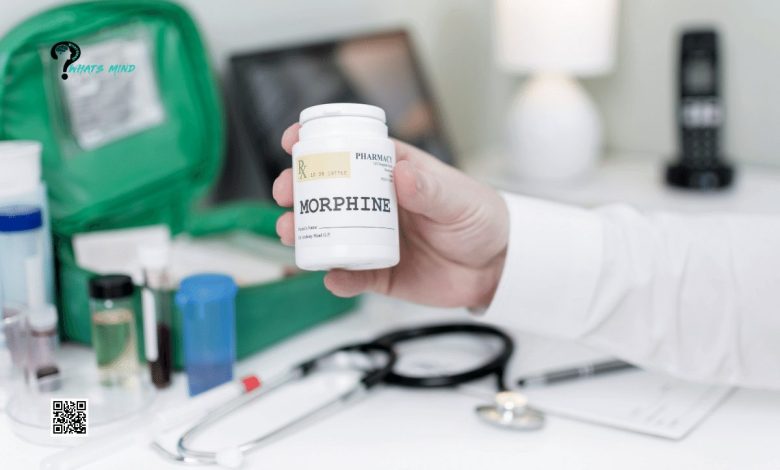How Addictive Is Morphine? Chemical Properties, Symptoms and Risks

Morphine, a powerful opioid pain medication, is often prescribed to manage severe and chronic pain. While it can be highly effective in treating pain, there are concerns about its addictive nature. Many individuals wonder how addictive is morphine and what are the risks associated with its use.
In this article, we will uncover the truth about morphine addiction and its impact on individuals. So, if you want to learn more about the addictive potential of this drug, its risks, and its consequences, read on!
Table of Contents
Factors That Influence the Addictive Nature of Morphine
Various factors influence the addictive nature of medicine. Here are key factors that contribute to the addictive potential of morphine:
Chemical Properties and Mechanism of Action
Morphine binds to opioid receptors in the brain. This activates the reward system and causes a release of dopamine. Dopamine is a neurotransmitter associated with pleasure and reinforces rewarding behaviors.
When discussing chemical properties and mechanisms of action, there are two key points: potency and rapid onset of action.
Potency
Morphine is considered a potent opioid. This means that it has a high affinity for the opioid receptors. This makes it more effective in managing pain but also increases its potential for addiction.
Rapid Onset of Action
Morphine has a rapid onset of action. It produces intense euphoria and relaxation within minutes of ingestion. This pleasurable rush can be highly addictive and lead to repeated use.
Development of Tolerance and Dependence
As mentioned, long-term use of this preventive drug can lead to tolerance. This means that the body becomes accustomed to the drug’s presence.
Thus, it requires higher doses to achieve the same effects. This leads to increased use and can quickly spiral into dependence.
Dependence occurs when the body adapts to functioning with it in system. It then experiences withdrawal symptoms when the drug is stopped. These symptoms can be severe and include:
- nausea
- vomiting
- muscle aches
- anxiety
Withdrawal Symptoms
The fear of experiencing withdrawal symptoms often prevents individuals from seeking treatment for its addiction. This is to note that withdrawal symptoms can be both physical and psychological. This makes it challenging to quit using the drug without proper support and treatment.
Psychological Factors
Individuals with underlying mental health issues, such as depression or anxiety, may be more susceptible to developing a medical drug addiction. The drug can provide temporary relief from these conditions. Thus leading to self-medication and, ultimately, dependence.
Morphine can provide psychological pain relief. This can be experienced by numbing emotional distress and negative thoughts.

This can be highly appealing to individuals with mental health issues. Thus making them more vulnerable to addiction.
Additionally, stress and trauma can also play a role in the development of morphine addiction. This means that addressing any underlying mental health issues and learning healthy coping mechanisms is crucial for long-term recovery.
Environmental and Social Factors
One’s environment and social circle can also influence one’s risk of developing a morphine addiction. The drug may be readily available in specific communities. This makes it easier for individuals to access and misuse.
Peer pressure and the normalization of drug use within social circles can also contribute to the development of an addiction. This is why it’s essential to seek support from friends and family. Thus, it is advisable to surround oneself with positive influences during recovery.
The Risks and Consequences of Morphine Addiction
Morphine addiction poses significant risks and consequences. It affects various aspects of an individual’s health, relationships, and well-being. Here are the key risks and consequences associated with morphine addiction:
Physical Health Risks
Morphine use can cause a range of physical health problems. This includes depression, which can be life-threatening. It can also lead to:
- decreased heart rate
- blood pressure
- constipation
- increased pain sensitivity
Injecting morphine also puts individuals at risk of developing infections at the injection site or contracting diseases such as HIV or hepatitis.
Psychological and Behavioral Consequences
Morphine addiction can lead to a range of psychological and behavioral consequences. This includes:
- mood swings
- irritability
- changes in sleep patterns
It can also cause individuals to engage in risky behaviors, such as driving under the influence or obtaining the drug illegally. In severe cases, this addiction can also lead to cognitive impairments and even psychosis.
Social and Interpersonal Consequences
Morphine addiction can negatively impact an individual’s relationships, leading to strained or broken relationships with friends and family. It can also cause problems at work or school, affecting one’s ability to function in daily life.
Additionally, individuals with this drug addiction may engage in dishonest and manipulative behaviors to obtain the drug, damaging their reputation and trustworthiness.
Risk of Overdose
One of the most significant risks of addiction is the risk of overdose. Users may increase their dosage to achieve the same effects as they develop tolerance. This can put them at risk for an overdose.
Overdosing on this medical drug can lead to respiratory failure and death. It’s crucial to seek help immediately if you suspect someone has overdosed on morphine.
Impact on Emotional Well-Being
This is interesting to note that morphine helps you be emotional in your personality. Thus, leading to feelings of:
- shame
- guilt
- hopelessness
It can also worsen underlying mental health issues and cause individuals to isolate themselves from loved ones. During this stay, one would require seeking help from a treatment center like Purposehealingcenter.com or other centers near you that offer comprehensive addiction treatment programs to help individuals overcome this addiction and regain their emotional well-being.
Getting Answers: How Addictive Is Morphine?
So, how addictive is morphine? It is a powerful and addictive drug that can cause dependence, withdrawal symptoms, and severe physical and psychological consequences.
The risks of morphine addiction are significant. This makes it crucial to seek help as soon as possible.
If you or someone you know is struggling with a morphine addiction, remember that recovery is possible with the right support and treatment. Don’t hesitate to reach out for help. Start your journey towards a healthier, drug-free life today.
From the health section, you may like to read about:
- Ways Nurses Can Contribute More to Healthcare
- The Healthcare Challenges of Tomorrow – How to Address Them?
- A Guide for Finding the Best Family Health Insurance Plans
- The Science Of Sleep: How Natural Supplements Can Enhance Sleep Quality
For more information, visit Whatsmind.com




